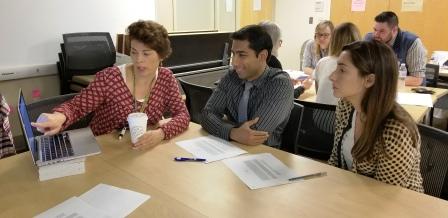More About our Curriculum
Foundations – The Groundwork for Your Residency Education
The first month of your residency will lay a foundation for your residency education. Through a variety of hands-on activities in this rotation, you will work with your peers and faculty to gain basic skills in the breadth of family medicine. Workshops during this month-long experience will include maternity care 101, inpatient bootcamp, medical informatics, experiential learning and more. The experience focuses on preparing you for the role of resident and physician. It also gives you a great opportunity to get to know your colleagues and settle into your new home.
Your Health Center Practice
Your health center is the place where you will grow and learn from experienced faculty role models/teachers of the highest caliber. You will spend increasing amounts of time caring for your own patients at your health center of choice over the three years of your residency. Typically, residents will spend 1-2 half days per week at the health center during the first year of residency and 3-5 half days per week during the second and third years. The health center faculty and staff have tremendous knowledge of the community and patients within the health center practices. They will get to know you individually and will provide the support and expertise you need as you develop into an experienced clinician. Our health center practices are continually evolving with an emphasis on serving the community. These medical homes include the chronic care model, open access, group visits, and family centered care that is integrated with a biopsychosocial approach to care.

Physician Leadership Curriculum
Each year the residents have an opportunity to work closely with their peers to gain skills in leadership. The first year rotation focuses on leadership in the community focusing on a community oriented primary care model. Residents work with their peers to develop a community project to address a local health need as well as investigate the resources of the community. The second year rotation involves an in depth look at the resident’s own practices. Residents will engage in Quality Improvement initiatives within the health center. Residents will work with their peers to learn teamwork and leadership skills to effect change within the health care setting. In the third year rotation, residents will learn the management infrastructure of the health center from how to hire staff to how to understand a budget. Throughout the three years, residents will continue this work with monthly meetings to focus on quality initiatives and team based care and will gradually take on more leadership in the health center.
Our Simulation Program
The UMass Worcester Family Medicine Residency Simulation Program was funded by a federal HRSA grant. The purpose of our program is to prepare family medicine residents to care for the underserved, using simulation to enhance resident procedural skills and patient access to comprehensive care. Simulation experience is integrated throughout residency training. In addition, there is time devoted specifically to working the simulators and task trainers during all 3 years of residency. A number of our Family Medicine faculty have completed certificate training in using simulation in medical education. Scenarios are designed, overseen and debriefed by trained faculty facilitators. Click here to read more about our simulators.